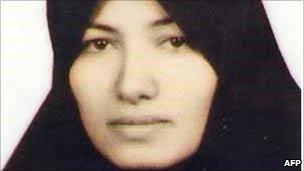Iran's dilemma over stoning
- Published

Iran has railed against Sakineh Mohammadi Ashtiani's defenders
The issue of stoning, as highlighted by the case of Sakineh Mohammadi Ashtiani, presents the Iranian authorities with a big dilemma.
It is notable that they have never formulated a clear defence of the practice.
When Iranian officials are challenged, their argument is that it is only carried out rarely, and following rigorous legal procedures - an assertion that is counter-challenged by human rights campaigners.
President Mahmoud Ahmadinejad has rarely, if ever, spoken about stoning in his many speeches directed towards the West.
To my knowledge, no pictures have ever emerged of a stoning being carried out in Iran, despite the widespread prevalence of cameras on mobile phones. It is not something they want to publicise.
Deeply sensitive
In the case of Ms Ashtiani, the authorities have railed against western reporting and campaigning on the issue.
But never have they explicitly denied that she was sentenced to be stoned for adultery, nor that such a practice exists.
Despite the daily gestures of defiance, the Islamic Republic is deeply sensitive to the way it is seen by the outside world. A nightly programme on state TV analyses and criticises foreign media reports.
The Iranian authorities like to portray an image of a country and a system misperceived and misrepresented in the West.
It is an image that plays well with some western liberals, who buy the argument that criticism of Iran's human rights record amounts to hypocritical double standards, or perhaps part of a wider campaign to "soften up" western public opinion in preparation for some future military action.
Hence the dilemma for the Iranian government about how to defend the practice of stoning - a punishment that offends those same western sympathisers.
Hard-line influence
The Iranian judiciary have made at least two attempts in recent years to abolish, or at least to suspend the penalty of execution by stoning. Even Ayatollah Khomeini is reported to have had his doubts about including it in the criminal code.
Still, human rights groups say Iran is the only country in which stoning is both legal and is still carried out.
Stoning cases keep re-emerging, usually in more conservative provinces. At least 20 Iranians, mostly women, are believed to be under sentence of stoning to death. About one or two cases are thought to be carried out each year.
It is evidence of the influence hard-line conservative clerics still have on the running of the country.
The difficulties presented by this case have been illustrated by the curious relationship between Iran and Brazil.
Tehran welcomed Brazil as a new friend, after President Luiz Inacio Lula da Silva argued against sanctions on the nuclear issue and tried to broker a compromise.
But the Brazilian government has been pressing Iran to exercise mercy in this case, and even offered asylum to Ms Ashtiani. The offer was not welcomed in Tehran.
'Confession'
So in recent weeks the Iranian authorities made strenuous efforts to silence those highlighting Ms Ashtiani's case.
One of her lawyers, Mohammed Mostafaie, fled the country after an arrest warrant was issued for him.
His wife and other relatives were held in prison for a time in an attempt, he believes, to force him to turn himself in.
He is now in Norway, but he is being accused in Tehran of "financial irregularities" in an attempt to discredit him.
Ms Ashtiani's son and others involved in the case were also put under pressure to stop campaigning for her life.
Now she has appeared on TV, in what looks like an attempt by the authorities to change the narrative.
The focus of her "confession" moved from the issue of adultery to that of murder.
It seems the strategy is to portray her as a common criminal, sentenced for a crime that also carries the death penalty in the US and many other countries.
The crime of adultery is mentioned in the broadcast, but almost in passing.
Further isolation?
The reporter says only that Ms Ashtiani "has been sentenced to a punishment stipulated in the law" - avoiding saying whether that punishment was death by stoning.
One of her lawyers has told the Guardian newspaper in Britain that this "confession" was forced out of her after two days of torture in prison.
Even so, in the televised version, she never actually admits to carrying out murder.
It is left to a judiciary official to talk about the manner in which she killed her husband.
In a previous interview with western media, Ms Ashtiani has insisted she was acquitted of murder.
It would seem from these latest events that she probably faces imminent execution, though most likely by hanging rather than stoning.
If that is the case then it will be seen as evidence of Iran taking itself one more step into international isolation.
It will also be a clear warning to western human rights campaigners and the media that pressure on Iran can sometimes be productive, and sometimes deeply counter-productive.
- Published9 July 2010
- Published12 August 2010
- Published3 August 2010